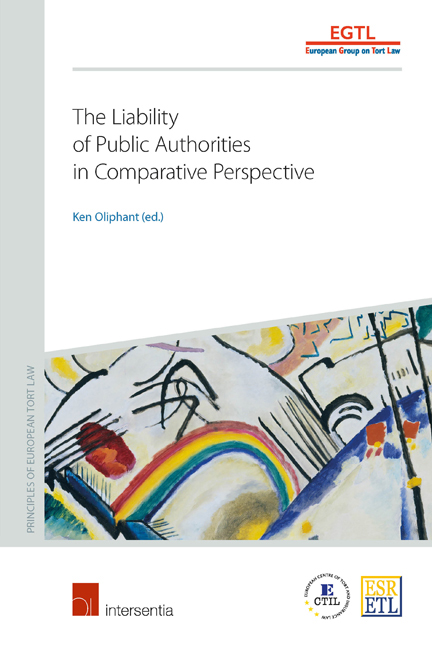Book contents
- Frontmatter
- Preface
- Contents
- List of Authors
- Introduction
- Questionnaire
- PART I PUBLIC AUTHORITY LIABILITY OUTLINED
- Austria
- Belgium
- Czech Republic
- Denmark
- England and Wales
- France
- Germany
- Greece
- Israel
- Italy
- The Netherlands
- Norway
- Poland
- Portugal
- South Africa
- Spain
- Switzerland
- The United States
- European Union
- The Liability of Public Authorities: an Economic Analysis
- PART II CASE STUDIES
- PART III CONCLUSIONS
South Africa
from PART I - PUBLIC AUTHORITY LIABILITY OUTLINED
Published online by Cambridge University Press: 27 November 2017
- Frontmatter
- Preface
- Contents
- List of Authors
- Introduction
- Questionnaire
- PART I PUBLIC AUTHORITY LIABILITY OUTLINED
- Austria
- Belgium
- Czech Republic
- Denmark
- England and Wales
- France
- Germany
- Greece
- Israel
- Italy
- The Netherlands
- Norway
- Poland
- Portugal
- South Africa
- Spain
- Switzerland
- The United States
- European Union
- The Liability of Public Authorities: an Economic Analysis
- PART II CASE STUDIES
- PART III CONCLUSIONS
Summary
INTRODUCTION
OVERVIEW
Although public authority (State) liability has expanded in the past few years mainly as a result of the introduction of a Bill of Rights into South African law, the basic approach remains the same. Under South African law, State liability is primarily judge-made private law. The State and its organs are vicariously liable for any wrong committed by its servants acting in their capacity and within the scope of their authority. The vicarious liability of the State is regulated by ordinary principles of delict and the ordinary compensatory delictual remedies are therefore available. Other appropriate relief may also be obtained for an infringement of a fundamental right by the State. The requirements for vicarious liability are the existence of an employer-employee relationship (where it is important that the State should have a right of control over the official); the commission of a delict by the official (where all the requirements of a delict, especially wrongfulness and fault, should be satisfied, where the bonafide and rational exercise of a State official's discretion will not be wrongful, and where the mere negligent statutory breach and consequent economic loss is not sufficient to hold State officials delictually liable for the improper performance of an administrative function); and the delictual conduct of the official must have taken place within the course and scope of his employment (where intentional conduct on the part of the official will, in the absence of a sufficiently close link between the official's act and the business of the State, not found vicarious liability). There is as yet no indication that the legislature as organ of State may be delictually liable. Although the judiciary is not an organ of State, the State can be vicariously liable for malicious conduct on the part of members of the judiciary. Otherwise the range of vicarious liability covers the national, provincial and local governments.
- Type
- Chapter
- Information
- The Liability of Public Authorities in Comparative Perspective , pp. 421 - 462Publisher: IntersentiaPrint publication year: 2016

